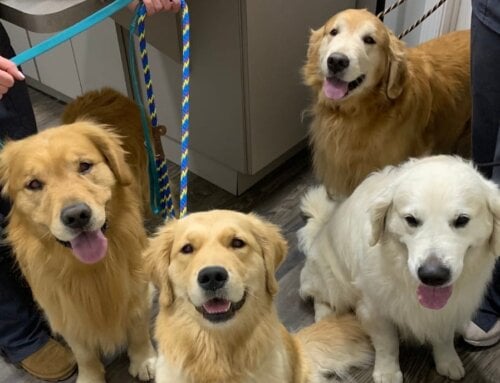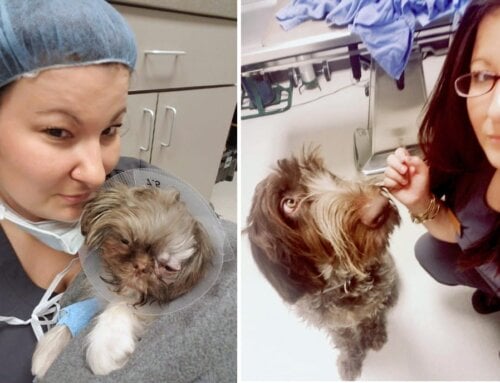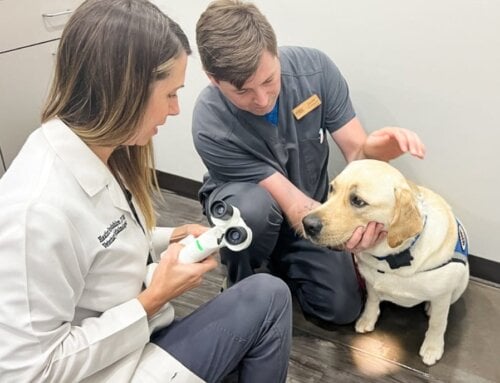Your pet’s eyes are red, tearing and swollen. Or it is pawing at the eye or bumping into furniture. It is natural to worry. How do you know if a general veterinarian can help or if you need a specialist?
“Your general veterinarian has excellent training in their field but will often suggest a veterinary specialist to address certain conditions—including cases concerning eyes,” said Dr. Heather Brookshire, a board-certified ophthalmologist and the owner of Animal Vision Center of Virginia. “That is when they may recommend a veterinary ophthalmologist. We are a wonderful resource for your pets, especially for breeds prone to heritable eye conditions.”
At Animal Vision Center of Virginia, Dr. Brookshire and her team often manage 200 or more ocular cases a week. Many of these conditions are ones that humans may experience, including corneal ulcers, glaucoma, dry eye, and excessive tearing. Some eye conditions, like cherry eye (a prolapsed nictitating gland) or entropion (where the eyelid turns inward), are visible with the naked eye.
However, many eye problems can be subtle, requiring specialized diagnostic equipment to properly identify. In cases that require surgical intervention, Animal Vision Center has a state-of-the-art surgical suite to manage all procedures at their practices.
“Our veterinary ophthalmologists perform cataract surgery, glaucoma implant and laser surgeries, and corneal crosslinking and graft surgeries on a routine basis,” Brookshire said. “We also help clients whose pets are experiencing low- or no-vision through our “Be Kind, I’m Blind” program, which offers guidance on engaging with nurturing their blind dogs.”
The role of genetics in eye health
Genetics also play a significant role in an animal’s development—including their vision. DNA often determines a pet’s physical traits and habits, and genetic testing can help identify potential health issues in pets (including their eyes) so that pet owners can make informed breeding decisions.
Brookshire’s practice provides Orthopedic Foundation for Animals (OFA) Eye Certification Registry examinations. By screening an animal’s eyes before breeding, her team helps OFA to achieve its goal of promoting the health and wellness of companion animals by reducing the risk of genetic disease. The eye exams occur before breeding and the outcome helps dog owners and breeders determine potential heritable eye diseases to avoid passing these on to future generations.
When to seek a specialist for your pet’s eyes
Many eye diseases are time-sensitive, so a prompt consultation or referral may be in a pet owner’s best interest if:
- Your pet’s eye condition has not responded to the recommended therapy.
- Their vision seems to be deteriorating despite treatment efforts.
- A corneal ulcer has not responded to treatment.
- Your pet is diabetic. Diabetes generally leads to cataracts, and you may need a consultation before they develop complete vision loss.
- Responsible breeders want to ensure their animals have no inherited ocular disease.
Veterinary specialists in the United States must board-certify with the appropriate American Veterinary Medical Association-approved organization, including ophthalmology. Your general practice veterinarian may suggest a referral to a veterinary specialist. You may ask for one too. Then together, your pet’s care team will work for the best outcome possible.
When to seek a specialist for your pet’s eyes
Many eye diseases are time-sensitive, so a prompt consultation or referral may be in a pet owner’s best interest if:
- Your pet’s eye condition has not responded to the recommended therapy.
- Their vision seems to be deteriorating despite treatment efforts.
- A corneal ulcer has not responded to treatment.
- Your pet is diabetic. Diabetes generally leads to cataracts, and you may need a consultation before they develop complete vision loss.
- Responsible breeders want to ensure their animals have no inherited ocular disease.
Veterinary specialists in the United States must board-certify with the appropriate American Veterinary Medical Association-approved organization, including ophthalmology. Your general practice veterinarian may suggest a referral to a veterinary specialist. You may ask for one too. Then together, your pet’s care team will work for the best outcome possible.
Ensuring your pet’s vision health
When it comes to eye health, time is often of the essence. Do not hesitate to seek the expertise of a veterinary ophthalmologist if your pet shows signs of discomfort or vision issues. Together with your general vet, a specialist can help ensure your pet enjoys a lifetime of good vision and comfort.
For more information about common eye conditions in pets or to schedule an appointment, visit Animal Vision Center of Virginia. Stay updated on the latest in animal eye care by checking out our blog, In Focus.
We love animals! Located in Coastal Virginia, the Animal Vision Center of Virginia is dedicated to helping animals live better lives through improved vision. Led by Dr. Heather Brookshire, a board-certified veterinary ophthalmologist, our team is dedicated to improving pets’ ocular health. We believe every animal deserves a happy, healthy life through better vision. Whether you are a referring veterinarian or a concerned pet owner, we are here to help, with locations in Virginia Beach and Chesapeake. Visit: www.animalvisioncenterva.com or call 757-749-4838.
















